Tony McNamara: developing, pitching and showrunning The Great
Academy Award-nominated writer Tony McNamara (The Favourite) on developing The Great from a play to a feature to the TV series, working with US studios, writing process and more.
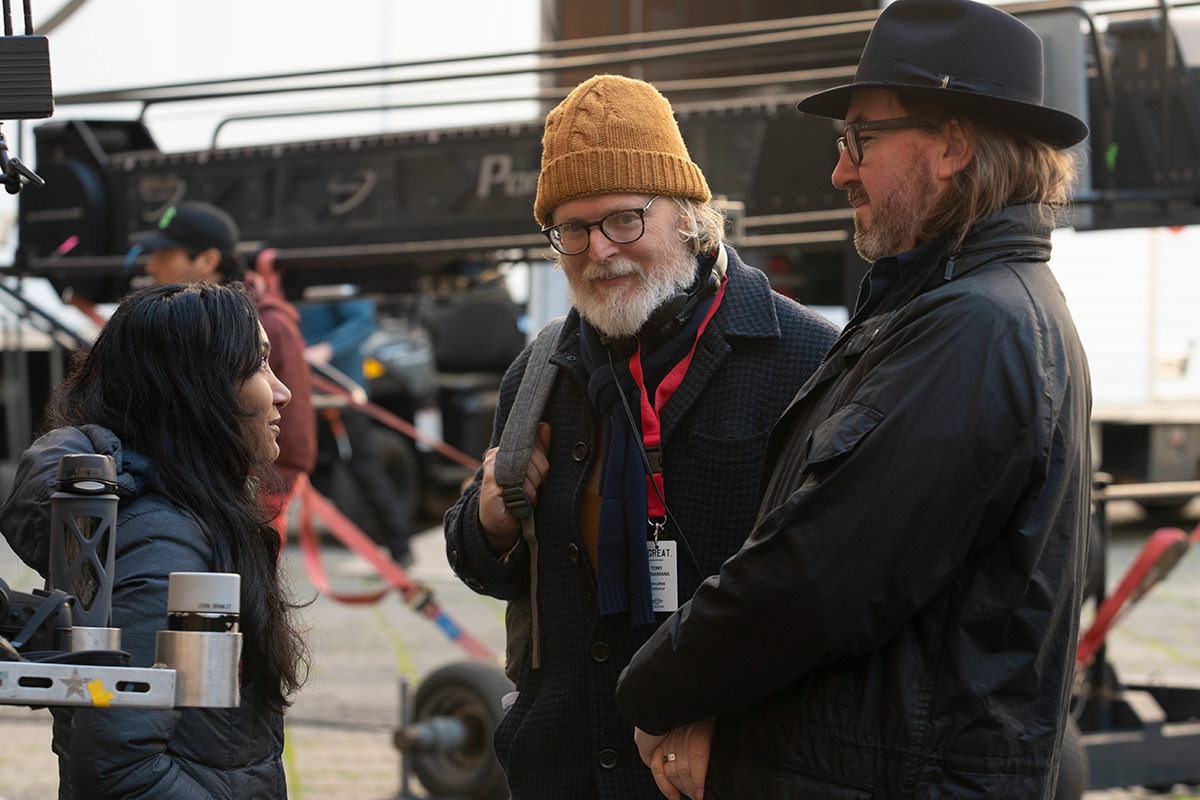 Tony McNamara on the set of The Great
Tony McNamara on the set of The Great
Not many who watch The Great would immediately realise its Australian origins.
It’s a fair oversight, considering it’s an irreverent take on 18th century Russia, was filmed in Europe, and stars Elle Fanning as a young Catherine the Great. But the 10-part Hulu TV series, streaming locally on Stan and just renewed for a second second, is the brainchild of Tony McNamara, the Australian writer who worked on Doctor Doctor, Puberty Blues and Love My Way before earning an Academy Award nomination for co-writing the screenplay for The Favourite.
In fact, the TV series The Great, which McNamara is creator, showrunner, and executive producer on, actually started out as a Sydney Theatre Company play in 2008. McNamara, who wrote the play, developed the story over a number of years with producer Marian Macgowan. The original intention was to make it a feature film (more on that later), with the project receiving three rounds of development funding from Screen Australia.
(Fun fact: Production Designer Fiona Crombie, who was also nominated for an Academy Award for The Favourite, designed the sets of The Great at Sydney Theatre Company. Both Crombie and McNamara also worked on Disney’s upcoming movie Cruella.)
The Australian connection doesn’t stop there. Once The Great was re-written as a pilot TV script and pitched to US networks in 2018, Hulu commissioned a pilot episode and then a series. The writers’ room for The Great took place in NSW, and the team of writers who brought it to life also included Australians Gretel Vella and Amelia Roper.
When we check in with McNamara, it’s 8am where he’s calling from in Perth and as a self-confessed morning writer, he’s already done a couple of hours of writing. However he can’t say what exactly he’s been working on, except that it’s a feature and a “contemporary comedy”.
But McNamara is much more forthcoming when it comes to the development of The Great, the pitching process in the US, the impact of The Favourite and his advice for Australian screenwriters. Read on for more.
Did the play The Great, the feature film script and the TV series all share that same comedic tone?
Yeah, they were very similar. In fact there are scenes in the pilot and occasionally in the series where it's literally pulled from the play. Almost no change.
You adapted it to a feature first – what were the main challenges?
The main challenges were that the play was bifurcated, so the first 45 minutes of the play was young Catherine and the second half was the older Catherine. So I had two different main characters. I told one story and a new story about halfway through. That was a difficult thing for a feature because you haven't got a lot of time to tell a complicated story. The tone was also hard. Not in the writing, but just at the time it was hard, especially with film, for the financiers to sort of… the tone was an issue because it was different.
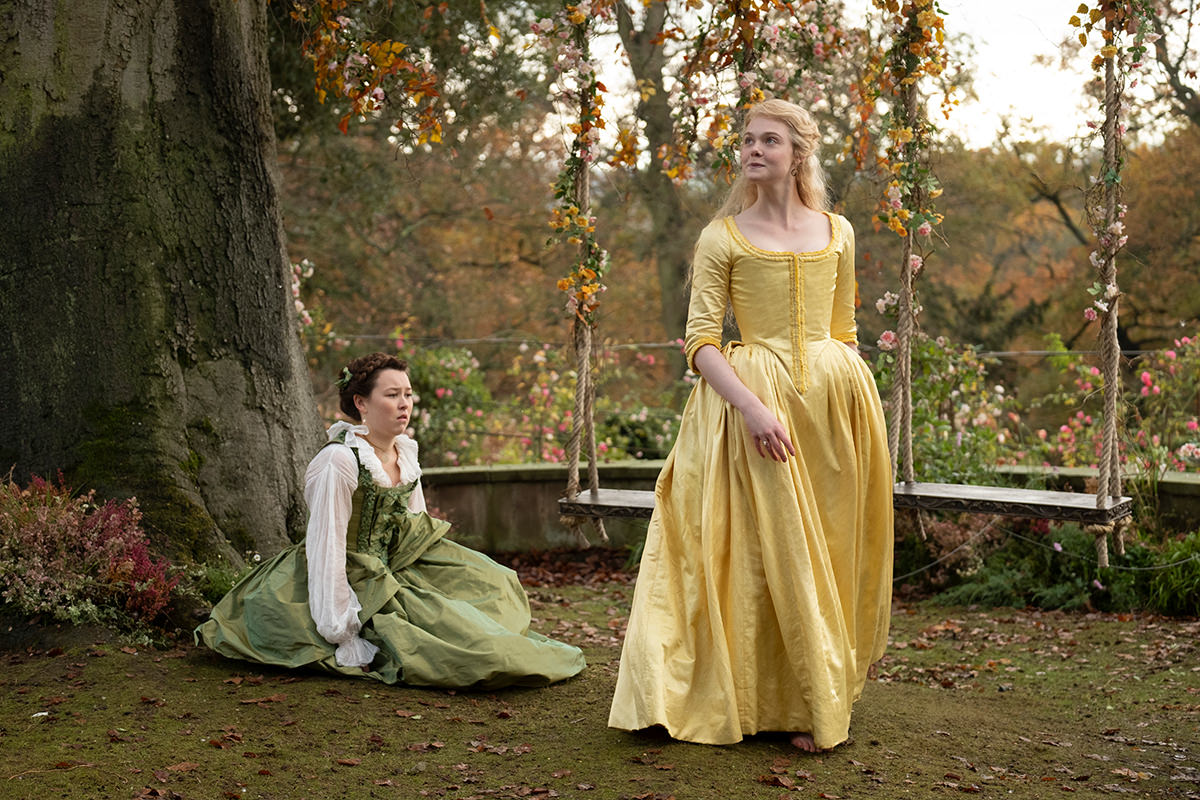 The Great
The Great
What prompted the decision to shift from making The Great as a feature and develop it as a TV series?
We had [the feature] almost up once or twice. It was one of those things where we were close a couple of times, and I think we could never quite get enough money. Because it was period, it was relatively expensive and I think we could get an amount of money that we knew we couldn't quite make it for. We were always trying to get that extra bit so we could make it properly and we never quite got there. And then I drifted into doing more TV and that became a big interest of mine. I liked writing screenplays and I was working with Yorgos [Lanthimos], but I think at the time I thought ‘this is a much better TV show’ because I'd written three or four pilots in the US, I'd got a feel for what I thought TV was, and [Catherine’s] story is so big that it was a bit like, ‘why are you trying to do this in 90 minutes? It doesn't make any sense at all.’
Perhaps the way TV changed in the last 10 years enabled you to tell the story you wanted?
I think that's true. TV had changed and continues to change. The networks now want things that have their own voice and their own take on the world. So it just was good timing on that front, because once I decided to [make it a TV series] it was relatively easy to sell it and, not get a green light for a series, but get a pilot order. That all happened quite quickly.
Did any of it coincide with your work on Doctor Doctor?
I did two seasons of Doctor Doctor, so I had probably left and been working with Yorgos on The Favourite and also this new film we have. Marian was still very persistent about us making it and so she kept it alive in my head. And then I think I'd seen Nic Hoult and I knew he could play Peter, so I was excited about that and it was just a natural thing. I wrote the pilot quite quickly because I'd written the screenplay and the play, so I knew the tone and I knew most of the characters. And then Nic and Elle [Fanning] read it and we went and sold it and that was all in a matter of maybe four or five months.
And when was all this happening?
So at the start of 2018, I wrote the pilot, I pitched it, and then we made the pilot. I think I'd started preproduction [on the pilot] in September when The Favourite launched at Venice, so I was shooting the pilot and jumping out to festivals. And also with the pilot, they wanted the second episode, so you deliver the pilot and the script of episode two. And then from there, we started a writers’ room for the [other episodes].
And when was filming on the series?
I think we started August last year, 2019. We started pre-production in August and then we finished filming in Italy on February 23rd.
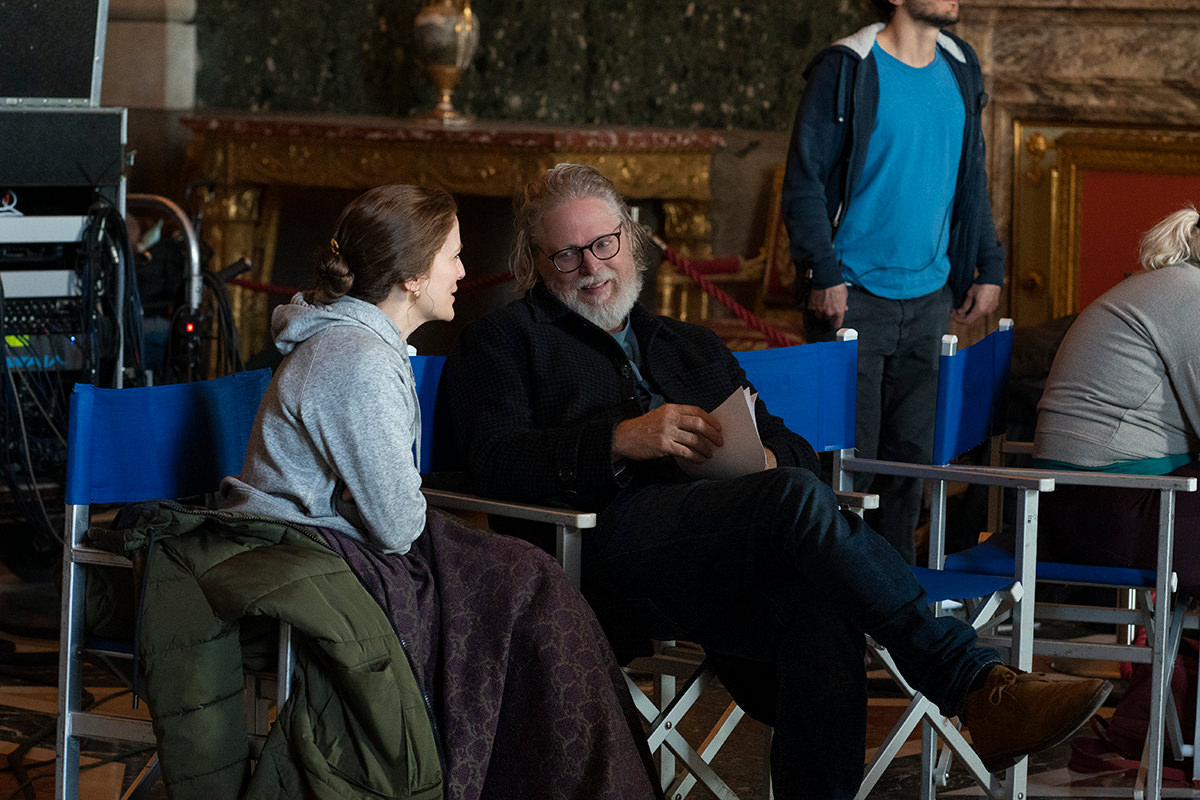 Tony McNamara on the set of The Great
Tony McNamara on the set of The Great
Can you talk through the pitching process?
Pretty much the showrunner pitches the show is sort of the way it happens [in the US]. So it was all networks who were interested in it from reading the pilot. Elle [Fanning] was with me - she went and did all the pitches with me. So she, Marian, and a couple of other EPs all said why they liked it and why they wanted to do it. And then I just pitched what the season would be, the 10 eps, where it started, where it finished, what a second season would look like - all that kind of stuff.
How did you land on 10 episodes?
You get a good solid number of acts out of [ten episodes]. And I knew the court drama would take a bit of laying out, because I think there's 12 main cast, so there's a lot for the audience to learn before you can even start getting too complicated.
How hard was it to pitch The Great prior to the release of The Favourite, so without that reference point for the unique tone you were going for?
It was hard, and it would have been impossible without a pilot script. But they had the pilot script and I don't know if they'd read The Favourite script, but that script had been around in Hollywood, because it had been out for casting and Fox Searchlight were funding it. I know I'd had a bunch of jobs out of it. But even off the script of The Great you could sort of understand the tone and to Hulu's credit, that was part of making the pilot. They were like, ‘we love the tone, but we're not 100% sure what it's going to be…’ They were very supportive in that they didn't have a tone they wanted me to shoot for. They were very much like ‘we know you have the tone in your head because you’ve explained it, but go and make it and show us what you mean. And we'll see if we like it’.
And from what I understand, there were a few networks interested during that pitching process?
Yeah five or six.
What was it about Hulu that made you go with them?
It was lot of things. I liked the streaming idea at the time, because there were other networks that weren't streaming and I felt like streaming was more the way TV was heading. [Also] period eats a lot of money and I knew that, so I felt like Hulu were giving us a really great budget and I wouldn't be having to compromise too much money-wise. And then above all, it was that I felt like they had faith in what Marian and I were trying to do, that they were going to back us to go make the show, and that they'd be really helpful and supportive. And that's exactly how they turned out.
Do you think there's a bigger appetite for risk in television and particularly with streamers?
Yeah, I think so. I know for networks in America, there's just so many shows being made, so they do have an appetite for risk and things that are different because they are the things that might get noticed and might get traction. So at the moment, that is what they're trying to find, things that might stand out and have a voice so that amongst the 500 shows, maybe you've got a shot at cutting through.
Was the speed of writing The Great comparable to writing for Australian TV?
It was very similar to Australia, the way the writing worked. We've got an American studio, but we always [had] a week for scene breakdown, three weeks for first draft, a week for notes.
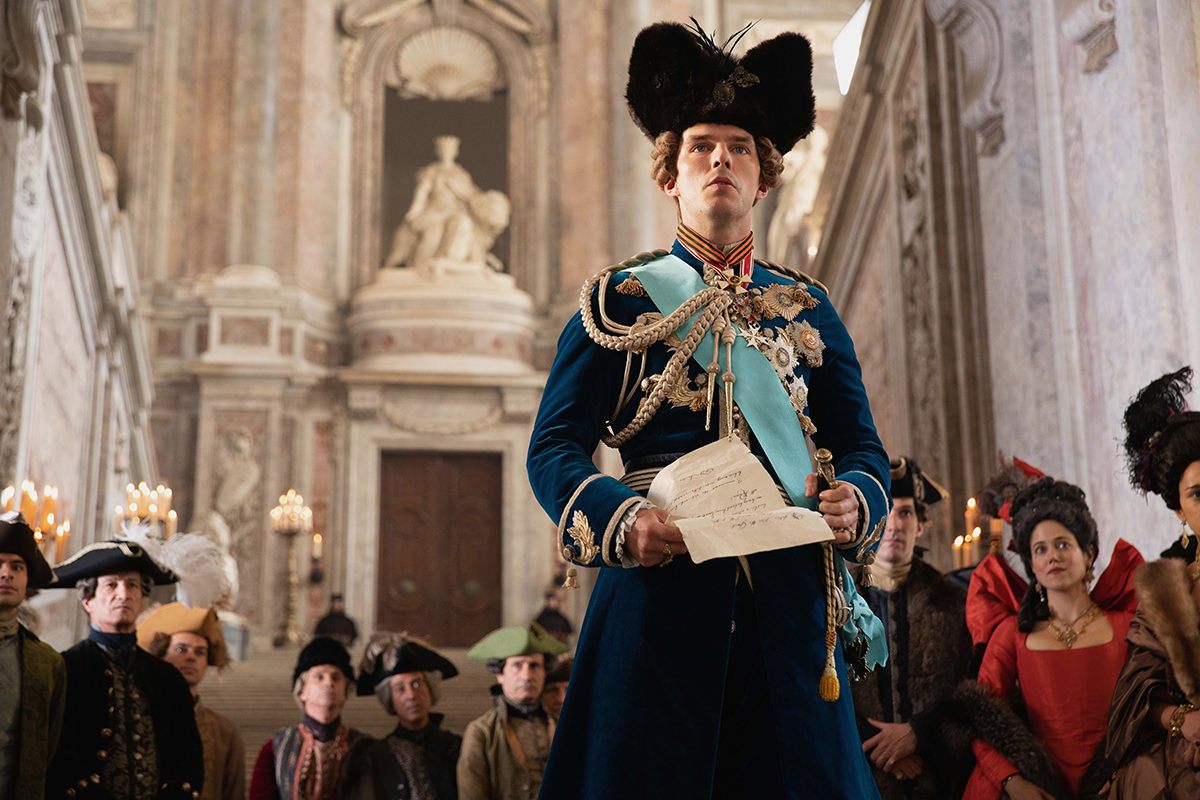 Nicholas Hoult in The Great
Nicholas Hoult in The Great
The writers’ room for The Great was held in NSW – was it a US set up or did you model it off what a writers’ room in Australia would be like?
I just ran it like an Australian room really, but the way we hired everyone was a US model, not an Australian freelance model. So not everyone, but a bunch of your writers stay with you almost the entire shoot. [Whereas] Australia is more freelance, where you drop in for your episode and you're not really around that much. But on this you keep writers, like Gretel [Vella] and James [Wood] were on pretty much the entire time. I wrote the last two episodes three weeks before we shot them, but they were in London as part of the room, and Amelia [Roper], for the majority of it as well. The American model is [also] that there's a writer on set all the time. And we were lucky because we were studio-based so my office was above all the stages and I was on set a lot. But the other writers were on set when I couldn’t be there, [and] the studio wants that. They expect a writer to be on set, which is good for the actors and the directors.
Do you think that Australia is moving more towards adopting that showrunner model like the US? Or have we made an amalgamation of different styles?
I guess we've made an amalgamation in some ways. But I think American TV doesn't talk about their non-writing EPs much. Most shows have a non-writing EP, and that's normally what I had with Claudia [Karvan] and Imogen [Banks] - they're producers and you do it together. And a lot of American writers have those people who help run the show really, especially in a practical sense. [Then] some American writers never go on set. They also have a director-producer model as well, which is often used, where there's a director who takes the reins of producing episodes. So it depends.
You're credited with writing on all ten episodes. Could you talk through that and balancing showrunning The Great at the same time?
I guess I wrote the lion's share of it because of the tone and because it's first season, even though James wrote an ep, Gretel wrote an ep with me, Tess [Morris] wrote an ep with me.
It’s hard [getting] the tonal consistency across the board on a show like this. On something like this, it takes a while to get everyone on the same page, from the writers to the directors to designer. But on your first season - and I've talked to other American showrunners in particular about this - if something's tonal like Orange is the New Black, and you're trying to do something particular, then it's hard not to want to write most of the scripts. Tone is the dialogue, in a way, but the tone of plotting and the tone of how we tell stories is also driven by the showrunner. What's vital to it is having a good room of writers who have a lot of ideas. My thing with writers' rooms is we're trying to make a better brain. And I think we achieved it because we had a lot of very different people. Gretel's a really young writer, Amelia's very political person and James is very old-school English and [with those] different aspects we made it into our own thing. I think that's the thing: though I scripted most of it, I think the writers’ room was really vital in the stories and ideas and research other people brought to the table.
When it comes to your writing process, do you aim for a certain number of pages a day?
It depends how quick I have to be. Normally I'll aim for about five. And then sometimes if I'm in a hurry… so I think on the finale I was on 15 pages a day.
You’ve said before that you also write in pen and paper first and then type it up. What do you like about that process?
I think it’s mentally easier. It's all just about psychologically tricking myself. If I write it on paper, I don't think it means much, so I'm not very judgemental of [it] and it doesn't seem such a big commitment. Whenever I think I'll be quicker if I just go straight to a computer, I'm not because I'm too judgmental and I don't get anywhere. And then typing it up, it's cheating a second draft in a way. And it's just a way [of writing] I developed.
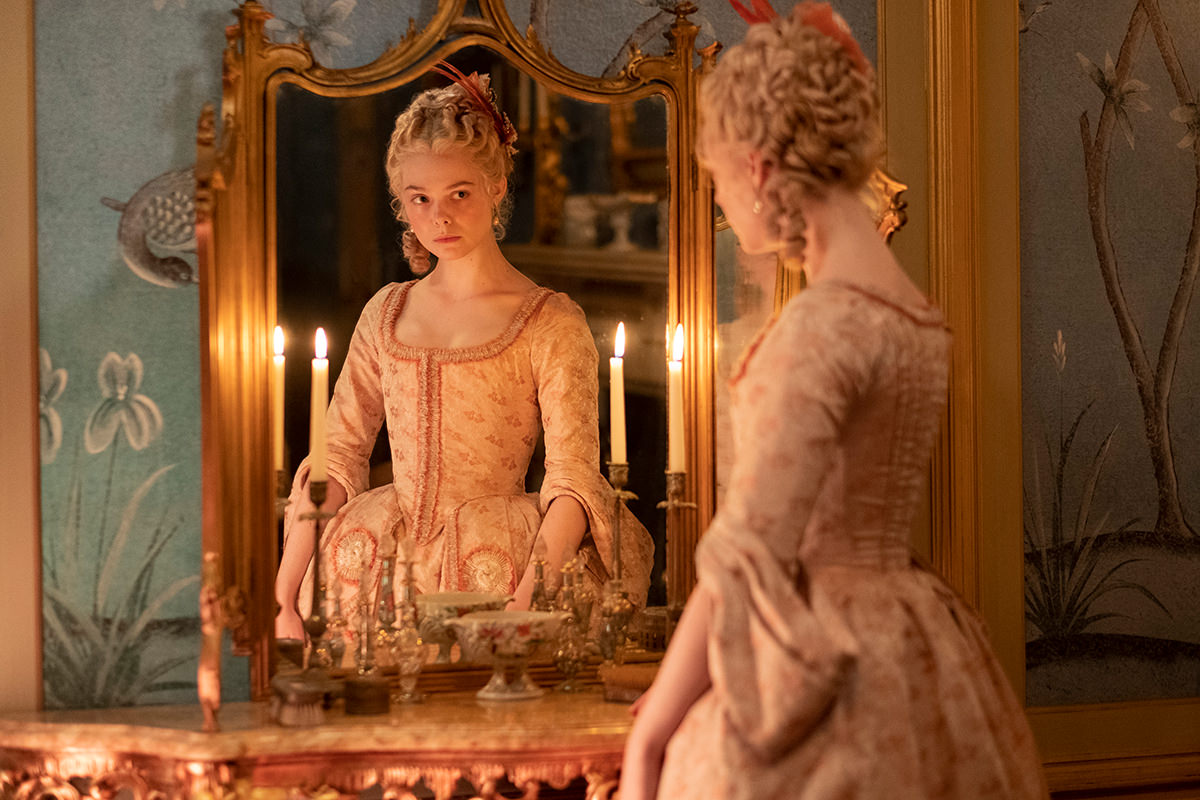 The Great
The Great
I think it's great because that is one of the things when Claudia [Karvan] and I were first doing it, that was one of our goals was to try and bring new writers through. John Edwards helped me, and a lot of writers who are my contemporaries were given their first job by John. It's actually hard sometimes to convince networks to bring new writers onto shows, but he was always very good at it and I think Claude worked with John in that way too. So we were both like, ‘we need to do that’. It was great because we gave directors who were eminently capable and talented like Lucy Gaffy a shot and brought through young writers like Gretel Vella [who’s] on The Great and Angela McDonald, and both of them have become, professional writers. So I think it's good. We've got to keep the industry going in that way.
What impact has The Favourite had on your career?
It changed a lot. It means people have a template, people know what you do. You get more offers. And people liked it. [Even] before the film came out, the script had already done me a lot of good. I'd written some movies [and] it had been a good calling card anyway. And once the Oscars happened everything becomes ‘more’, you know, you get more offers, you get paid better, and if you want to pitch something, it's easier to get the meetings. It was such a great experience creatively writing it and working with Yorgos and all those people, [that] then for the Oscars to happen and for the movie to do so well it was just a massive bonus.
You mentioned how you had been writing in the States previous to The Favourite – what was that experience like working as a writer in the US selling scripts that then don’t necessarily get made?
I don't think there's any writer who works who doesn't have that experience. And I think David Chase famously was always just trying to sell a pilot a year and hoping it didn't get made. But I did that for a few years and you make great money and it's creatively fun, but they develop a lot of stuff, so you need a lot of things to go right to get to the next bit of making it. And I mean, that was a few years ago, so network was still the main game and they weren't making the level of stuff [they are now]. But I was happy for those few years, because it gave me an insight into their system and how things worked, which was really useful when I actually got to do it [with The Great]. It was helpful because I sort of understood how studios thought and I understood their system, so it wasn't a real learning-curve jump when I had to make a show there.
What advice would you have for Australian writers?
It's boring advice, but I would say get a process for how you write that works for you, which can actually take a little while. Also realise the TV business is now a global business, and so I think writers need to see themselves in that way. You'll always want to tell Australian stories because as a writer you're Australian and that's what you're attracted to. But the international TV industry - hopefully after COVID it'll bounce back - but it's just a creatively interesting space. So I think the advice is: find yourself a good process and teach yourself your craft; and realise that the business you're in is not limited by borders. It's very much an open door around the world for good story and people who can write.
Watch The Great on Stan, Doctor Doctor on 9Now, and The Favourite on Foxtel.
This interview has been edited and condensed.

What to read next
Claudia Karvan on producing Doctor Doctor with writer Tony McNamara and Ian ‘Jolly’ Collie, and returning to collaborate with Nine Network.
07 Sep 2016
Caris Bizzaca